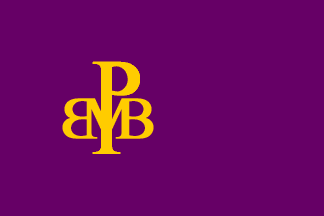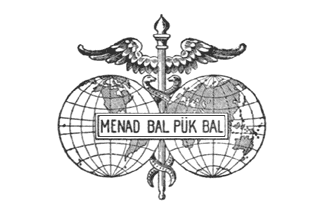
image by Michael Everson

FOTW beschäftigt sich mit der Wissenschaft der Vexillologie (Flaggenkunde).
Alle auf dieser Website dargebotenen Abbildungen dienen ausschließlich der Informationsvermittlung im Sinne der Flaggenkunde.
Wir distanziert uns ausdrücklich von allen hierauf dargestellten Symbolen verfassungsfeindlicher Organisationen.
Last modified: 2017-10-07 by antónio martins
Keywords: volapük | mbpb | monogram: mbpb | map: world | caduceus | menad bal, pük bal. |
Links: FOTW homepage |
search |
disclaimer and copyright |
write us |
mirrors
See also:
External links:
A lot of enthusiasm pumped this 1880 project to a very wide popularity
during it’s first 10 years, but linguistic and social inconsistencies
within set it’s fall and disappearence by the turn if the century.
Currently Volapük is cultivated for fun by some enthusiasts, mostly
esperantists. I don’t think they use any logo or badge.
António Martins, 05 Jun 1999
(conjectural flag)

image by António Martins, 21 Jan 2005
A different emblem for Volapük was a
"MBPB" monogram made from the initials of the motto
«Menad[e] bal, pük[i] bal»; I register its use in
several occasions, more than once in ex-libris and personal coats of arms,
here Pectra-Sancta hatched for Purpure
monogram Or.
António Martins, 21 Jan 2005
(conjectural flag)

image by António Martins, 05 Jun 1999
Rodríguez [rod97] shows a symbol
consisting of a world map (two hemispheres) over a Mercury rod (with wings
and snakes) and a plaque with the motto overall. This read «Menad
bal, pük bal», meaning «One humanity, one language».
(Sometimes a variation with dative and accusative is used instead:
"Menade bal, püki bal".)
António Martins, 05 Jun 1999
The image above is based on a reasonable assumption that such a flag
could have been made by putting an emblem on a white background.
António Martins, 21 Jan 2005
In Panorama in interlingua 2/1991: p.16 “Ab le
archivo” [ial91a] black and white
symbols of constructed languages from «our archive» (probably
the image sources as for [rod97]?),
which I quote: (dates are probably language publishing, not symbol
creation, judging from the Esperanto example): «Volapük,
1880»: emblem with winged staff, as in
[rod97].
António Martins, 13 Aug 2007
Anything below this line was not added by the editor of this page.
Hosted by: Fanshop-Online.de und Handy-Shop.de
Tipp: Apple iPhone XR